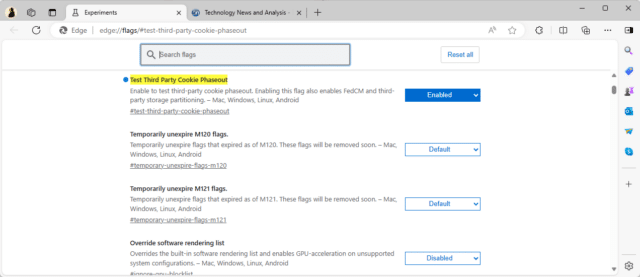Privacy Preserving Ads: Microsoft's plan to eliminate third-party cookies

Third-party cookies are on their way out. Google plans to disable third-party cookie support in Chrome for all users later this year. Mozilla and Apple announced plans to drop support for third-party cookies in their browsers, Firefox and Safari, as well.
Microsoft announced its plans for a third-party cookie-less future this week. Third-party cookie support is eliminated in Microsoft Edge in the near future.
Why third-party cookie support is being removed
Most third-party cookies are used for user tracking. They allow publishers and advertising companies to track users across websites.
To better understand how this works, it is important to understand the difference between first and third-party cookies. Sites that you visit may save cookies and other site data on your device. These are first party cookies, if they are saved by the actual site you visited. Any cookie saved by Betanews, for instance, while on Betanews, is considered a first-party cookie.
Third-party cookies may be saved and read by other sites, if their content is loaded on the Betanews website. Ads come to mind, and this is used for tracking purpose predominantly.
The removal problem
There are two main issues linked to the removal of third-party cookies. Sites that require them may refuse to work at all or some functionality may be limited or unavailable.
Several Microsoft 365 services do not work in browsers that do not support third-party cookies.
The bigger issue does not affect users at all, but it is vital for the advertising industry: the main method of tracking users won't work anymore.
Google introduced several proposals to integrate a less invasive form of tracking, which it calls Protected Audience API. In Chrome, Google uses euphemistic terms such as Privacy Sandbox.
In essence, it is a shift from individual user tracking to group-based tracking.
Microsoft's privacy preserving ads API proposal
Microsoft's Ad Selection API looks similar to Google's API on first glance. Its main aim is to show targeted ads to users and give advertisers the tools at hand to do so.
The API does so through interest groups, similarly to Google's API. Key differences between the APIs exist, which Microsoft lists here.
Microsoft's API proposal is compatible with Google's API to a large degree. One of the core differences is that Microsoft wants ad tech to be in control and that there is no shared infrastructure services between ad tech and the browser.
Both proposals have in common that advertisers may still show ads based on tracking to users.
End of third-party cookies in Edge

Microsoft follows Google's lead. It plans to block third-party cookies in 1 percent of Edge installations initially, but only on non-managed devices. The rollout is monitored and Microsoft plans to gather information to make changes accordingly.
Microsoft says that commercial customers won't be affected by these experiments. Information about the deprecation of third-party cookies for commercial customers will be revealed at a later date.
Edge users, commercial or not, who want to test the deprecation of third-party cookies in the browser may do so already in the following way:
- Load edge://flags/#test-third-party-cookie-phaseout in the browser's address bar.
- Set the status of the experimental feature Test Third Party Cookie Phaseout to Enabled.
- Restart Microsoft Edge.
Photo Credit: gcpics/Shutterstock
